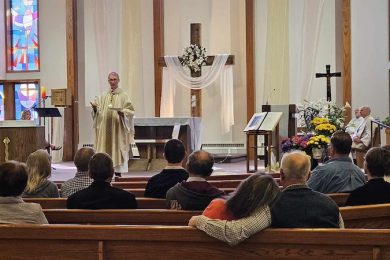By Mitch Finley| Catholic News Service
“A Lutheran’s Case for Roman Catholicism: Finding a Lost Path Home” by Robert C. Koons. Cascade Books (Eugene, Oregon, 2020). 159 pp., $22.
Robert C. Koons, the author of this remarkable book, is professor of philosophy at the University of Texas at Austin, and he declares that he makes no claim to being a theologian. A lifelong Lutheran (Missouri Synod), he became a Catholic in 2007.
His slim volume is a detailed explanation of why he believes that being Catholic makes more sense, historically, scripturally and theologically, than being Lutheran or, by extension, any other kind of mainline Protestant.
Influenced by St. John Henry Newman’s 19th-century “An Essay On the Development of Christian Doctrine,” Koons became convinced the central bone of contention between the Catholic and Lutheran traditions is the doctrine on justification.

The classic Lutheran position has been that salvation comes by faith alone, whereas the classic Catholic position has been that salvation requires both faith and good works.
“All other issues,” Koons writes, “are secondary: ‘sola scriptura,’ the role of the papacy, purgatory, the veneration and invocation of the saints, and so on.”
Koons discusses in detail the historical and contemporary understandings of both the Lutheran and Catholic understandings of justification. He then addresses the Lutheran and Catholic positions on “sola scriptura” (Scripture alone as source of divine revelation).
It may be helpful to Catholic readers to understand that it is not without significance that Koons comes from Missouri Synod Lutheranism rather than from the Evangelical Lutheran Church in America. The Missouri Synod is more biblically and theologically conservative while the ELCA is progressive and more at home with post-Second Vatican Council Catholicism.
Thus it is less likely that a Missouri Synod Lutheran, such as the author of this book, will become a Catholic, and more likely that an ELCA Lutheran may do so. That Koons did become a Catholic, however, may mean that he is more comfortable with a conservative “take” on being Catholic than an ELCA Lutheran would be.
Regardless, however, Koons declares that his decision to become Catholic “was driven purely by an intellectual conviction that the Reformation was founded upon a number of theological errors.”
He also makes clear that he retains a deep gratitude for his Lutheran roots, dedicating his book thus: “To my many Lutheran forebears who faithfully passed on to me the sacrament of baptism and the fundamentals of the Christian faith.”
Finally, Koons completes his book with three appendices. The first is a commentary on relevant texts from the Council of Trent’s response to the Reformation. The second appendix comments on Lutheran and Catholic “proof texts” from Scripture on justification, and the third is a discussion of St. Augustine of Hippo’s letter on “Justification As Inherent Righteousness.”
“A Lutheran’s Case for Roman Catholicism” will appeal to readers who value an intellectual discussion more than one rooted in emotional and/or psychologically relevant issues.
It also may attract readers both Protestant and Catholic who are simply curious about why someone would switch from a mainline Protestant church to Catholicism. In particular, it may be helpful to Catholics who wonder if it would be a good idea to leave behind being Catholic to become one form of Protestant or another.
Finley is the author of more than 30 books on popular Catholic theology, including “The Rosary Handbook: A Guide for Newcomers, Old-Timers and Those In Between,” “What Faith Is Not” and “The Seeker’s Guide to Being Catholic.”





















